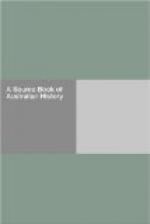April 12th. I determined on sending Hopkinson and Mulholland, whose devotion, intelligence and indefatigable spirits I well knew, forward to the plain.
The joy this intimation spread was universal. Both Hopkinson and Mulholland readily undertook the journey, and I, accordingly, prepared orders for them to start by the earliest dawn.
Six days had passed since their departure; we remaining encamped. I had calculated on seeing Hopkinson again in eight days, but as the morrow would see us without food, I thought, as the men had had a little rest, it would be better to advance towards relief than to await its arrival.
On the evening of the 18th, therefore, we buried our specimens and other stores, intending to break up the camp in the morning. A singular bird, which invariably passed it at an hour after sunset, and which, from the heavy flight, appeared to be of unusual size, had so attracted my notice, that in the evening M’Leay and I crossed the river in hope to get a shot at it. We had, however, hardly landed on the other side, when a loud shout called us back to witness the return of our comrades.
They were both of them in a state that beggars description. Their knees and ankles were dreadfully swollen and their limbs so painful that as soon as they arrived in the camp they sunk under their efforts, but they met us with a smiling countenance and expressed their satisfaction at having come so seasonably to our relief. They had, as I had foreseen, found Robert Harris on the plain, which they reached on the evening of the third day. They had started early the next morning on their return with such supplies as they thought we might immediately want. Poor Macnamee had in a great measure recovered, but for some days he was sullen and silent; the sight of the drays gave him uncommon satisfaction. Clayton gorged himself; but M’Leay, myself, and Fraser could not at first relish the meat that was placed before us.




